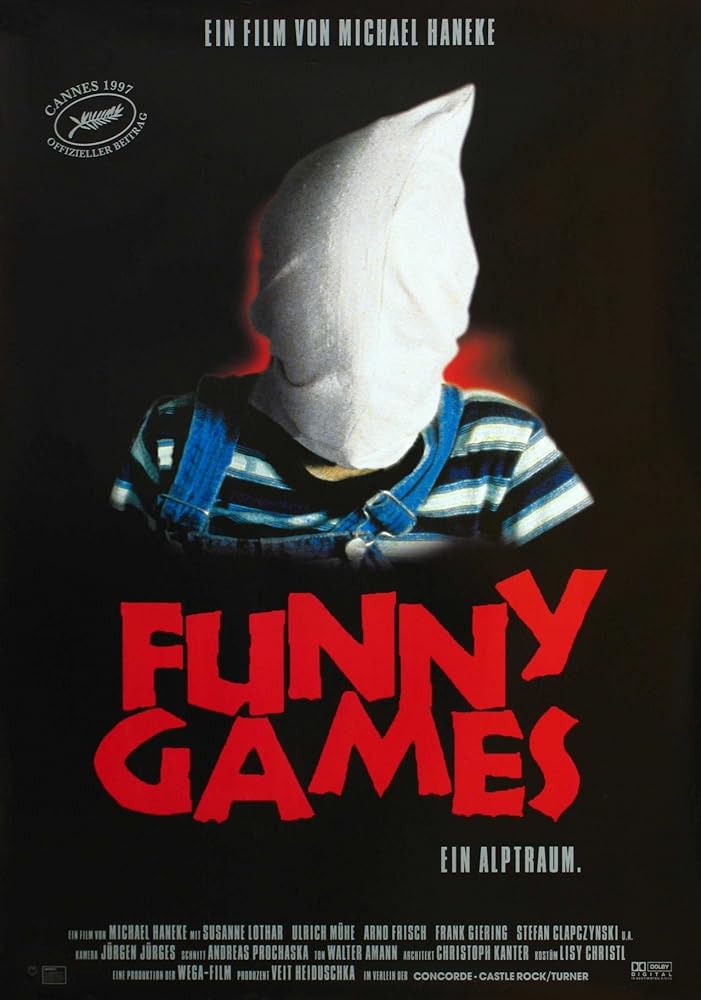F UNNY GAMES
UNNY GAMES
(director/writer: Michael Haneke; cinematographer: Jürgen Jürges; editor: Andreas Prochaska; cast: Susanne Lothar (Anna), Ulrich Muhe (Georg), Arno Frisch (Paul), Frank Giering (Peter), Stefan Clapczynski (Georg jr.); Runtime: 108; Wega Film; 1997-Austria-Austrian with English subtitles)
“If you want, this is a high-class Texas Chainsaw Massacre.“
Reviewed by Dennis Schwartz
A cold thriller, exploring violence by heaping up a huge quantity of exploitative violence to make some points about what is the public’s attitude and tolerance level for the random violence that is rampant in modern society. In other words this is an exploitative film railing against exploitative films, if that makes sense. It holds to the so-called philosophy, of fighting fire with fire. By crafting an intelligent screenplay and not going for the unnecessary showing of gore, much of which is done off-screen, the director is able to keep the film arty. But by playing with the public’s prurient interest in violence as a way of life, something they have been numbed into accepting as part of their television and MTV inheritance, this powerful story has something chilling to say on the rationality of the public’s viewing habits and the public’s responses to violence.
This film follows a wealthy, well-educated couple, Georg and Anna (Ulrich and Suzanne), and their young son, Georg Jr. (Stefan), going to their isolated luxurious, lakeside summer resort home, to do some boating, golfing and escape from the summer heat. A polite, clean-cut intruder, Peter (Frank), borrows eggs from them for their neighbor and won’t leave. He turns rude as his partner, also clean-cut, Paul (Arno), soon arrives to torment the couple, smacking Georg’s knee with a golf club so that he is disabled. The remainder of this film turns into a hostage situation.
The most riveting scene is where Anna is forced to strip and is subject to possible rape, while her son is blindfolded and her husband is forced to answer ridiculous questions. The hostage situation is barely watchable, as the mental torture the couple is put through is sickening. These psychologically sadistic tormentors offer no true explanation for their actions, using mockery and cynical responses to mask the power trip they are on. They have no redeeming human features, and their cruel intent is played up for the camera’s benefit. Paul even winks at the camera, as if the audience is in on this game they are playing. In one of the scenes the camera is rewound when the audience is given the gratuitous pleasure in seeing one of them killed, but even this is not granted when the scene is finally rewound.
The family tries to survive and hold onto their dignity, and to manage in the best way they can. These misfits play games pretending to give them choices in choosing their suffering, but always threatening to kill them before they leave. The thugs take on fictitious names. They keep referring to themselves as Tom and Jerry, or Beavis and Butt-head. Paul calls Peter by the name of Fatty several times to the mock displeasure of Peter, Tom, Beavis, or whatever he’s called. Their phony stories of who they are and how they were brought up, their pretenses at politeness, all are aimed to leave the viewer dismayed.
The director’s aim was to reduce everyone to a cartoon character. He wanted to make it appear that we can grow to expect violence as a natural part of life. That aim doesn’t work as well as the director might hope it does. The family is real to the audience. Georg’s lack of courage and quiet in the face of danger leaves him distraught, unable to face himself. Anna’s resolute behavior and her human foibles make us sympathize with her even more so, even if we are not particularly enamored by the way she deports herself when she is in control of things. Her son’s confusion touches us deeply. We see him look for direction to his now helpless parents, which is a nightmare for any parent to be faced with. They are forced to be in a situation where they can’t protect their child.
There could be an argument made that if you don’t like what you are seeing, then don’t see the rest of it. That’s well and good! And if that is your philosophy on how to how to handle such a film with so much inflammatory material, I can’t condemn you for it. I would think that many people of sound mind would feel this way and will walk out of the theater. But I don’t think as the director thinks, in an interview he gave to a film magazine, that people who stay to see the entire movie really need the movie. I don’t, necessarily, need this movie. I stayed to see what this film was actually trying to say about violence. And, I was disappointed that with all its novelty and games and pretenses, it offered nothing much in the way of seeing things differently. It is successful not because of its message, but because it is a well-crafted film. This film succeeds with the small share of the audience it can garner because it is, surprisingly enough, entertaining; and, it broaches a subject that is very difficult to understand, that piques our interest as we watch to see if there is anything new to say about such random violence. And the hope is, that we might be able to understand violence a little bit better afterwards; even if, this understanding has to come by way of an exploitative film.
As far as its critical success, I think it is merely a better version of all those Halloween type of grizzly macabre pictures we are subjected to– if you want, this is a high-class Texas Chainsaw Massacre.
REVIEWED ON 1/30/99 GRADE: B-